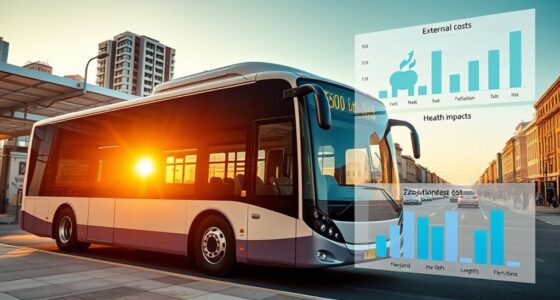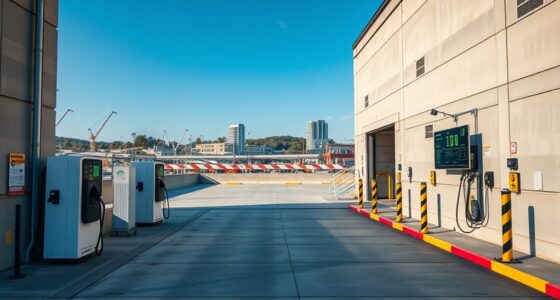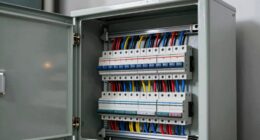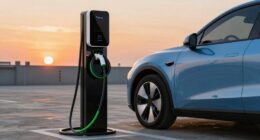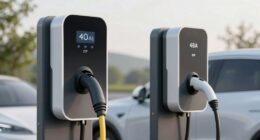If you’re converting your VW Bus to electric, you’ll need to notify local authorities and submit documentation on your conversion, including details of the motor and battery setup. You may also require a vehicle inspection to verify safety and compliance with emission standards, and your vehicle might need to be re-registered or updated in the system. Understanding these legal steps helps avoid fines, and exploring further can guide you through a smooth conversion process.
Key Takeaways
- Notify local authorities and submit detailed documentation of the electric motor, battery, and conversion components for approval.
- Undergo certified vehicle inspections to ensure safety standards and compliance with emission regulations.
- Re-register the vehicle as a new make or model, providing proof of conversion, inspection reports, and parts receipts.
- Confirm whether your region offers specific exemptions or streamlined processes for electric vehicle conversions.
- Stay informed about local legal requirements, fees, and necessary paperwork to ensure smooth registration and legal operation.

Converting a VW Bus to electric is an exciting project that combines nostalgia with modern innovation. As you plan your conversion, understanding the legal requirements and registration issues is essential to guarantee your vehicle is roadworthy and compliant. One of the first technical considerations is the battery capacity you choose for your build. The battery capacity directly impacts your vehicle’s range, allowing you to travel farther on a single charge. Larger batteries mean a higher cost, both in terms of the batteries themselves and the overall conversion costs. You’ll need to balance your desired driving range with your budget, making sure your choice aligns with local regulations and your personal needs.
When it comes to legal requirements, most jurisdictions will require you to notify authorities about your vehicle’s modifications. This process often involves submitting detailed documentation of the conversion, including specifications of your electric motor, battery pack, and any other major components. Some regions may need you to have the vehicle inspected by certified inspectors to verify that it meets safety standards. These inspections guarantee your VW Bus is safe to operate and that emissions are within acceptable limits, even if the vehicle is now electric. It’s important to familiarize yourself with your local Department of Motor Vehicles or equivalent agency’s rules, as requirements can vary widely. Additionally, understanding the electric power generation options available can help you optimize your conversion for efficiency and sustainability.
Registration issues can be a bit more complex, especially if your vehicle’s classification changes due to the conversion. In many areas, converting a gas-powered vehicle to electric may require re-registering the vehicle as a new make or model. You’ll likely need to provide proof of the conversion, such as receipts for parts and installation, along with the inspection reports. Some regions may also require you to update your vehicle’s title to reflect its new status as an electric vehicle. Additionally, there could be specific emissions testing exemptions or special registration categories for EV conversions, which can simplify the process. It’s a good idea to consult with local authorities or an experienced professional to understand what paperwork is needed and any potential fees involved.
Frequently Asked Questions
Do I Need Special Insurance for My Electric VW Bus?
You might wonder if you need special insurance for your electric VW bus. Generally, your insurance requirements remain similar to a gas-powered vehicle, but coverage options could vary. It’s wise to check with your insurer about electric vehicle coverage and any modifications. Some providers may offer specialized policies or discounts. Make certain your policy covers the electric conversion, battery, and charging equipment to stay protected and compliant on the road.
Are There Tax Incentives for Converting a VW Bus to Electric?
Imagine opening hidden treasures—tax incentives await! You can often benefit from tax credits or government rebates when converting your VW bus to electric. These incentives aim to encourage eco-friendly choices and can greatly offset conversion costs. Be sure to check local, state, or federal programs, as eligibility varies. Taking advantage of these financial perks helps you save money while contributing to a cleaner environment.
How Does Conversion Affect the Vehicle’S Resale Value?
Converting your VW bus to electric can boost its resale value if it appeals to buyers interested in eco-friendly vehicles. However, factors like battery longevity are critical; a well-maintained battery can enhance appeal, while poor battery performance might reduce value. Market demand for vintage electric conversions is rising, which could positively influence resale price. Ultimately, a successful conversion that emphasizes durability and modern features can make your bus more attractive to future buyers.
Can I Register My Electric VW Bus as a Classic Car?
You can often register your electric VW bus as a classic car if it meets age and condition requirements. However, you might face restoration challenges, especially if the vehicle’s historical classification emphasizes original parts. Authorities typically consider the vehicle’s age, appearance, and modifications. Confirm your bus retains a vintage look and meets specific standards to qualify as a classic, simplifying the registration process and maintaining its nostalgic value.
What Safety Standards Must My Electric Conversion Meet?
You need to guarantee your electric conversion meets safety standards for battery safety and electrical compliance. This means using certified batteries and proper insulation to prevent hazards. You should also adhere to local electrical codes, including wiring and fuse requirements, to ensure safety during operation. Regular inspections and proper documentation help confirm your vehicle complies with safety standards, making it safe and legal to drive on the road.
Conclusion
As you navigate the legal and registration hurdles, it’s almost poetic how your vintage VW bus transforms into a modern marvel. Each step you take not only revives a classic but also reflects a future where tradition and innovation coexist. Sometimes, the most unexpected journeys lead to the most meaningful destinations. So, keep pushing forward—your dedication to blending the old with the new reminds us that change often begins where history and hope intersect.



